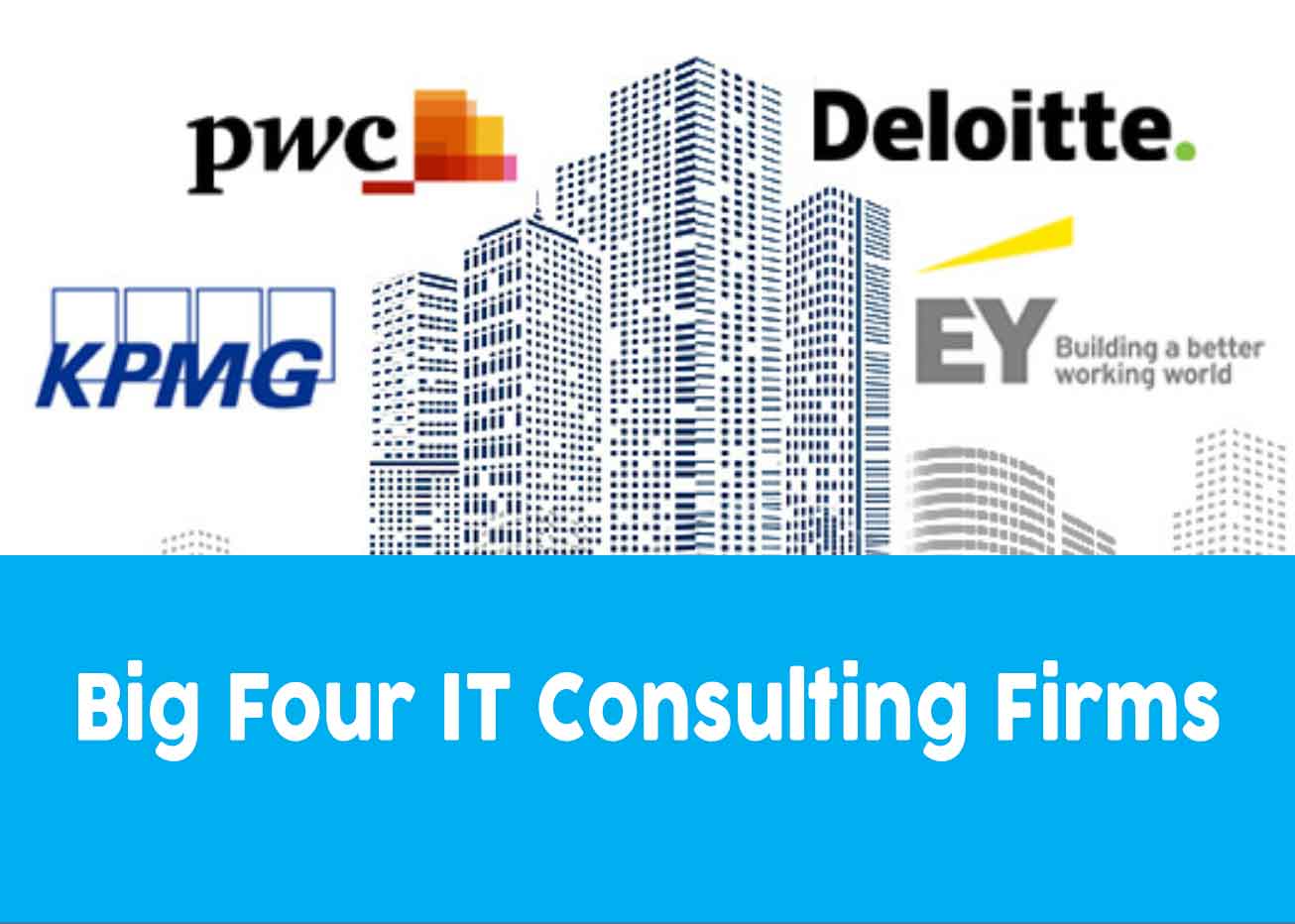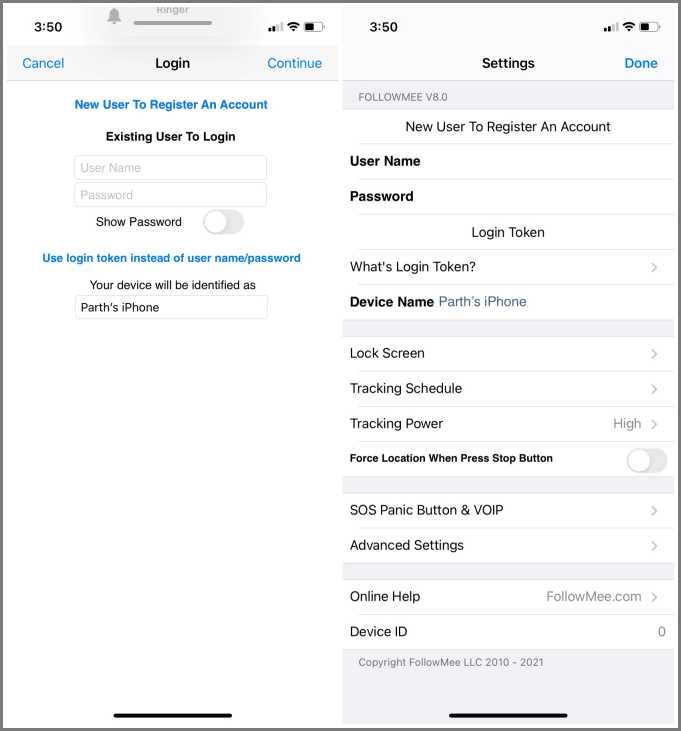Many of our clients contact us because they are interested in working in the big four, they know that they will have to be very competitive, due to the level of demand of these companies and they seek in our services a plus that positions them with an advantage over their competitors.
The Big 4, are a type of solid, stable and recognized companies worldwide, they are an excellent starting point in the consulting or auditing area for any professional with talent and ambition, we invite you to continue reading this article where we are going to explain everything you need to know how to work on the Big Four or Big 4.
1) What are the Big Four?
They are basically the four largest consulting firms in the world; among them you can find:
-
KMPG
The name of this company is the acronym for the surnames of its founding leaders; Piet Klynveld, James Marwick, Sir William Barclay Peat, and Reinhard Goerdeler each formed their own law firms in different parts of Europe and North America. In 1987 the merger was consolidated that gave rise to the financial advisory consortium that we know today; It has more than 200,000 employees and manages an amount of $ 28.96 billion annually, with branch offices around the world.
-
Hey
It was founded in 1989 by Arthur Young and Alwin Ernst, it is in charge of financial advice, auditing, taxes, finance and many other functions that have placed it on the list of the 10 most successful companies in the sector in the United States of America and one of the most recognized in the world. It handles a payroll of 284,000 employees and generates revenues of more than $36 million annually .
-
PwC
Its name is the abbreviation of Price Waterhouse Coopers, Price Waterhouse was its founder in the year 1849, that’s right, this company is more than 171 years old! In 1998 they merged with Coopers & Lybrand to create what is today the second largest audit, legal professional services and consulting firm in the world. It manages revenues of more than 42 and a half million dollars a year, with a payroll of 276,000 people around the world.
-
Deloitte
It is currently the number one Professional Services company covering consulting, legal and financial advice, taxes and auditing. Deloitte Touche Tohmatsu Limited was founded in London in 1845 by William Welch Deloitte. Having 175 years of experience has not only made it a witness to history, they have also positioned it in the first place of the companies in this field, receiving revenues of more than 46 million dollars per year, with a payroll that covers more than 260,000 employees.
2) What do the Big Four do?
The Big Four are specialized in Professional Services, ranging from consulting for legal processes and human capital; and the audit of financial processes as its main pillars.
Working in the Big Four implies managing complex corporate cases, evaluating economic transactions, mergers, acquisitions, business strategies, process engineering, tax optimization, among others, but at a high level and for the top international firms. In addition to investigating the origin of the funds, compliance with commercial and legal agreements. They also serve to make business projections in order to know the sustainability of the company in the future and generate work models that optimize processes and much more.
3) Is it easy or difficult to work in a Big Four?
Every year, the large consulting firms hire thousands of people after demanding recruitment and personnel selection or headhunting processes. The big four tend to hire junior profiles recently graduated, without experience or with a minimum of 2 years experience, usually with brilliant academic records, to train them professionally under their corporate culture and methodology.
The professional who decides to start or continue his professional growth in one of the big four, must be well prepared for technical, psychological and knowledge tests related to the position for which he is applying.
In addition to an excellent academic record, they are looking for professionals with a very solid profile in soft skills and people with professional ambition.
4) What profiles are the Big Four looking for?
Generally, for Junior profiles, they look for economists, lawyers, people from the accounting area, ADE, among others. Professionals with specific knowledge from theory and practice, but who also have attitudes such as adaptability, ability to innovate and especially to solve problems quickly and effectively.
Degrees from reputable business schools are often valued.
Currently, other highly requested profiles to work in the Big Four are focused on the area of cybersecurity, AI, computer analysis and machine learning.
Senior profiles are selected according to their work experience where they demonstrate high-level skills that make them suitable for the needs of the company. They must have important higher studies, professional specialization courses, certifications and languages.
The profiles requested are focused on people with proven experience in the sector who apply, among the most used selection methods are: through headhunters, specialized meetings, conventions organized through events, professional associations, contest program, contacts or referrals.
5) What is it like to work in the Big Four?
Working in the big four implies great demand and responsibility, large amounts of information to analyze, in complex and delicate areas, for large international clients, many expectations and money at stake.
The consulting and auditing work is normally carried out directly in the clients’ offices, they are carried out in teams whose size will be determined by the dimensions and deadlines of the project.
These can last for several months and require one or more junior employees and a senior to lead them. The history of financial statements, records, clients and any other pertinent transaction is investigated as the job requires. It is a meticulous process that implies dedication, analytical skills, ability to work and solve complex problems.
A junior consultant usually takes a minimum of two years to aspire to a senior position, and then two more to aspire to a management position; in which there are other stages: Manager and Senior manager before aspiring to the position of partner. It all depends on the evaluations carried out and the availability of vacancies.
In the early stages the technical component is basic, in later stages the gift of people, time management, team management and contacts play a very relevant role.
6) What does working at the Big Four contribute to your professional background?
There is an undeniable fact for everyone who has the opportunity to belong to these companies, working for the Big Four on your CV is a huge endorsement of your professional credibility.
Working in one of the big four implies learning and working with methodologies and good practices that only a company of this level can offer.
Working in the big 4 allows you to have contact with a wide variety of projects, sectors and companies. Facing complex challenges, working alongside high-performance teams and side by side with the leaders of the most cutting-edge companies.
The professionals who work in the big four acquire a global vision of the business that gives them great professional versatility to provide great value in the end company, other consulting firms or to create a successful company.
7) What does it mean to work on the big 4 on your CV?
Working in the big 4 is definitely an enriching experience. It will help you obtain other job opportunities since, in addition to your own personal brand, you have the addition of the corporate brand of the consultancy (“value is presupposed”), it will undoubtedly open many doors for you, having experience in a big four sells.
8) How much do the big four pay?
In addition to the socioeconomic benefits, variable salary and bonuses, the fixed base salary in one of these companies can reach 25,000 euros per year for a Junior profile. We hope that this article on “Working in the Big Four” will help you decide, if You are interested in going further, getting the most out of your profile and getting the job you’ve always wanted, check out our services and career consulting. From Employment Orientation, we help professionals like you to get the job they are looking for, request a free review of your case, here.
The Big Four and their Human Resources policies
PwC: Price Waterhouse Coopers
Renowned for being the most annoying, oldest, and slow-moving organization. While they react more slowly to changes in the business world than others in the Big 4, they have a very strong core of customers. This is good if you are a detail-oriented person who likes the hierarchical nature of an organization.
PwC has seminars and training programs for its current and potential employees. Their program is online, free, and available to the public. Those looking to earn CPE (Continuing Professional Education) credits can do so on the PwC Open University website.
Deloitte
Deloitte has been named the best place to launch a career and one of the best places to work on many occasions.
While they continually compete for the top spot in the Big Four, Deloitte is the opposite of PwC in terms of work culture. Deloitte is the most entrepreneurial and moving fast within the Big Four. It invests heavily in its people, including making large investments in facilities like Deloitte University.
It has several recruiting teams that visit college campuses across the country, hoping to recruit those who have taken classes involved in its association program. Some of the universities that have these programs are Columbia Business School and Duke University.
Ernst & Young (EY)
EY is a more traditional accounting firm than either Deloitte or KPMG. It is very focused on its core audit and tax competencies (they have the second largest audit and tax practices after PwC).
Ernst & Young is consistently rated in the top five jobs by DiversityInc magazine. With so many areas of interest, anyone in the accounting business is sure to find a position that suits their specialization.
Additionally, they offer online and on-the-job training programs and host college recruiting events each year, where they hire entry-level associates.
EY would be a good option for anyone who is also considering joining PwC. New hires generally do rotating programs for 1-2 years in different specialties.
KPMG
KPMG is the smallest of the Big Four, but is generally considered the best in terms of work-life balance. What it lacks in prestige it makes up for in employee engagement.
KPMG caters for employees who value both their career and personal life. While some of the Big Four have a “top or bottom” culture, KPMG tries to retain employees (and has the lowest churn rate as evidence).
The firm offers three main services. These include audits, advisory services, and taxes. However, these three services can be divided into many subservices, making it a full service company.
KPMG is somewhere between the old-school accounting firm (PwC) and the most agile, high-tech consulting firm (Deloitte). While auditing is still a substantial part of what they do, their assurance practice is growing rapidly.
It is also known for its endorsement programs, sponsors of sports professionals such as golfer Phil Mickelson. The firm is home to a very culturally diverse work environment and works with companies that are not yet as successful. He does much of his recruiting on college campuses, looking for the best and the brightest.
These companies are the four largest professional services firms in the world. If you are interested in the world of economics, finance and new technologies, do not miss the opportunity to train and you could end up working in large firms such as the Big Four. This link can be the first step towards success.








